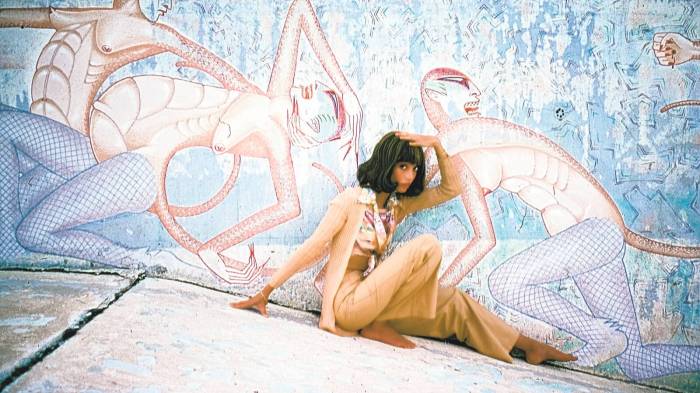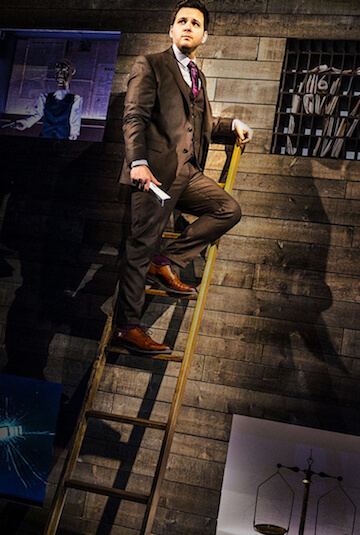Craig Lucas is not one to shy away from tough topics. The out gay dramatist was among the first to tackle AIDS in his screenplay for “Longtime Companion” and more obliquely in “Prelude to a Kiss” and “The Dying Gaul” (both plays he later made into films). In “Prayer for My Enemy,” he contemplates scars from the Holocaust and other miseries. Lucas wrote the libretto for the recent Met opera “Two Boys,” about one teen’s attempt to murder another. The list goes on.
And now, in “Ode to Joy,” the prolific playwright expands on a pair of nagging themes in his works: alcoholism and substance abuse. But as the upbeat title suggests, this is no finger-wagging screed against the perils of addiction. Rather, the pleasures of vodka and ecstasy-fueled romps are on prominent display, and even when the highs come crashing down, as they always do, a perverse glee can be found among the shattered glass, blood, and vomit.
It’s this uneasy clash that gives this darkly comic melodrama an urgent resonance, like two tectonic plates grinding against one other to create an earthquake.
New Craig Lucas play sifts through the wreckage of addiction
Unlike many of Lucas’ works crammed with too many ideas and inflated with fantasy, “Ode to Joy,” which he also directs, is surprisingly focused. There are only three main characters, each deeply flawed in some way.
The bisexual, angst-ridden painter Adele meets a sobbing Bill, a cardiac surgeon who may have cancer, at a deserted bar, and the two hit it off, generously lubricated with multiple scotches. Within minutes they foolishly plan on adopting a wire-haired dachshund together. The initial thrill is intoxicating, but it goes very sour very quickly.
Adele’s other serious relationship is with Mala, a miserable, bossy pharmaceutical exec who is in dire need of a heart transplant (the symbolism is a bit heavy-handed). Mala is repulsed by Adele’s tormented paintings, but for some reason is drawn to the equally tormented artist. For a few years, anyway.
Lucas makes things interesting by toying with the structure, jumbling the narrative with flashbacks and fast-forwards. The piece is set in New York over a 15-year span.
The play’s opening line helpfully encapsulates its intent. “This is the story of how the pain goes away,” says an agonized Adele holding a paintbrush to a canvas, clearly in some sort of physical pain (she has shingles). We later learn it’s the emotional pain she’s more concerned about.
The actors do their best to elicit empathy for the vile trio. As Adele, Kathryn Erbe, known for “Law & Order: Criminal Intent,” reveals flashes of regret for her selfish, cruel behavior. Arliss Howard invests the smarmy enabler Bill with a suave charm that makes Adele’s attraction to him totally convincing. Roxanna Hope is exceptional as the shrill, nasty Mala who mellows considerably after her surgery (and after walking out on Adele).
If “Ode to Joy” pulses with an edgy authenticity, that’s because it’s inspired by Lucas’ personal struggle to get sober — his own spin on “Long Day’s Journey Into Night.” Part cautionary tale, part catharsis for the playwright, the drama is awash in AA-style catch phrases like blame and making amends and forgiveness. Defensive about her boozing and pill-popping, Adele calls Mala’s pleas to get help “relentless Twelve-Step bullshit.”
And if you’re wondering why a play titled “Ode to Joy” is obsessed with pain, it’s partly because, as Lucas sees it, pain and pleasure are two sides of the same coin. Plus, he’s intentionally being ironic — a prominent theme in the piece (the codependent couple debate the definition of irony, with Bill arguing that it’s a “discrepancy”).
Of course, the title is also a nod to Beethoven’s Ninth Symphony, which, come to think of it, has its share of sharp, strained passages. Lucas even sneaks in a snippet of the iconic symphony when Bill and Adele first meet at the bar.
By play’s end, after the lies and breakups and reunions, we realize that Adele and Bill are not just addicted to booze and pills, but to each other. As this provocative if arduous “Ode to Joy” suggests, perhaps trading one addiction for another is part of the human condition, and we should stop trying to fight it. As Adele says, “True joy is acceptance.”
ODE TO JOY | Cherry Lane Theatre | Rattlestick Theatre Company | 38 Commerce St., west of Seventh Ave. S. | Through Mar. 30: Tue.-Sat. at 8 p.m.; Sat. at 2 p.m.; Sun. at 3 p.m. | $21-$66 at rattlestick.org or 866-811-4111 | Two hrs., 30 min., with two intermissions









